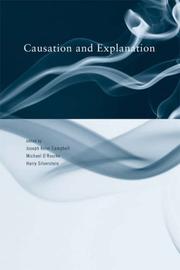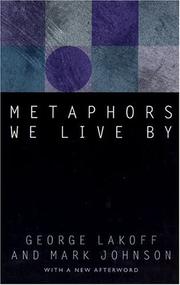| Listing 1 - 10 of 13 | << page >> |
Sort by
|
Book
Year: 2019 Publisher: University College London
Abstract | Keywords | Export | Availability | Bookmark
 Loading...
Loading...Choose an application
- Reference Manager
- EndNote
- RefWorks (Direct export to RefWorks)
The Origins of Self explores the role that selfhood plays in defining human society, and each human individual in that society. It considers the genetic and cultural origins of self, the role that self plays in socialisation and language, and the types of self we generate in our individual journeys to and through adulthood.Edwardes argues that other awareness is a relatively early evolutionary development, present throughout the primate clade and perhaps beyond, but self-awareness is a product of the sharing of social models, something only humans appear to do. The self of which we are aware is not something innate within us, it is a model of our self produced as a response to the models of us offered to us by other people. Edwardes proposes that human construction of selfhood involves seven different types of self. All but one of them are internally generated models, and the only non-model, the actual self, is completely hidden from conscious awareness. We rely on others to tell us about our self, and even to let us know we are a self.
Book
ISBN: 178735251X 1787352528 Year: 2019 Publisher: London UCL Press
Abstract | Keywords | Export | Availability | Bookmark
 Loading...
Loading...Choose an application
- Reference Manager
- EndNote
- RefWorks (Direct export to RefWorks)
In the past decades, translation studies have increasingly focused on the ethical dimension of translational activity, with an emphasis on reflexivity to assert the role of the researcher in highlighting issues of visibility, creativity and ethics. In Reflexive Translation Studies, Silvia Kadiu investigates the viability of theories that seek to empower translation by making visible its transformative dimension; for example, by championing the visibility of the translating subject, the translator’s right to creativity, the supremacy of human translation or an autonomous study of translation.Inspired by Derrida’s deconstructive thinking, Kadiu presents practical ways of challenging theories that argue reflexivity is the only way of developing an ethical translation. She questions the capacity of reflexivity to counteract the power relations at play in translation (between minor and dominant languages, for example) and problematises affirmative claims about (self-)knowledge by using translation itself as a process of critical reflection.
Book
ISBN: 9780444517470 9780080930879 0080930875 1280582057 9781280582059 9786613611833 6613611832 0444517472 Year: 2012 Volume: 14 Publisher: Amsterdam : Elsevier/North Holland,
Abstract | Keywords | Export | Availability | Bookmark
 Loading...
Loading...Choose an application
- Reference Manager
- EndNote
- RefWorks (Direct export to RefWorks)
Philosophy of Linguistics investigates the foundational concepts and methods of linguistics, the scientific study of human language. This groundbreaking collection, the most thorough treatment of the philosophy of linguistics ever published, brings together philosophers, scientists and historians to map out both the foundational assumptions set during the second half of the last century and the unfolding shifts in perspective in which more functionalist perspectives are explored. The opening chapter lays out the philosophical background in preparation for the papers that follow, which demon
Philosophy of language --- Linguistics --- Philosophy. --- Language and languages --- Philosophy
Periodical
ISSN: 14144247 18081711
Abstract | Keywords | Export | Availability | Bookmark
 Loading...
Loading...Choose an application
- Reference Manager
- EndNote
- RefWorks (Direct export to RefWorks)
Knowledge, Theory of. --- Knowledge, Theory of --- Théorie de la connaissance --- Periodicals. --- Périodiques --- Arts and Humanities --- Philosophy --- theory of knowledge --- philosophy of science --- philosophy of language --- ontology --- logic --- epistemology --- Epistemology --- Theory of knowledge --- Psychology
Book

ISBN: 3110470489 3110472503 9783110472509 9783110470185 9783110470482 3110470187 Year: 2018 Publisher: Berlin Boston
Abstract | Keywords | Export | Availability | Bookmark
 Loading...
Loading...Choose an application
- Reference Manager
- EndNote
- RefWorks (Direct export to RefWorks)
Relevance drives our actions and channels our attention; it shapes how we make sense of the world and communicate with each other. Irrelevance spreads a twilight which blurs the line between information we do not want to access and information we cannot access. In disciplines as diverse as philosophy, sociology, the information sciences and linguistics, "relevance" has been proposed as a key concept. This book is the first to bring together the often unrelated traditions. Researchers from different fields discuss relevance and relate it to the challenges of "irrelevance", which have so far been neglected despite their significance for our chances of making well-informed decisions and understanding others. The contributions focus on theoretical and conceptual questions, on specific factors and fields, and on practical and political implications of relevance and irrelevance as forces which are even stronger when they remain in the background.
Relevance. --- Pragmatics. --- Pragmalinguistics --- General semantics --- Language and languages --- Logic, Symbolic and mathematical --- Semantics (Philosophy) --- Pertinence --- Relevancy --- Meaning (Philosophy) --- Meaning (Psychology) --- Philosophy --- Relevance --- Pragmatics --- E-books --- Lexicology. Semantics --- Philosophy of language --- Cognitive Science. --- Communication. --- Phenomenology. --- Relevance Theory. --- Social Theory.
Periodical
ISSN: 00032638 14678284 Year: 1933 Publisher: Oxford : Basil Blackwell,
Abstract | Keywords | Export | Availability | Bookmark
 Loading...
Loading...Choose an application
- Reference Manager
- EndNote
- RefWorks (Direct export to RefWorks)
Analysis is the most established and esteemed forum in which to publish short discussions of topics in philosophy. Analysis maintains a distinctive, concise style and covers a wide range of topics including: philosophical logic and philosophy of language, metaphysics, epistemology, philosophy of mind, moral philosophy, and political philosophy. Since 2009, Analysis has included Analysis Reviews, a new section of the journal devoted to reviewing recent work in analytic philosophy. This section highlights recent books by leading writers of the philosophical world, featuring enlightening reviews of some of the best work in contemporary philosophical thought. This section is essential reading for anyone interested in philosophical discussion.
Philosophy of language --- Analysis (Philosophy) --- Philosophy --- Philosophie analytique --- Philosophie --- Periodicals --- Périodiques --- Philosophy. --- #FHIW:CAT1 --- Arts and Humanities --- General and Others --- Religion. --- Religion --- Arts and Humanities. --- Périodiques --- EBSCOASP-E EJPHILO EPUB-ALPHA-A EPUB-PER-FT JSTOR-E --- Analytic Philosophy. --- Mental philosophy --- Humanities --- Taalfilosofie

ISBN: 9780262532907 0262532905 9780262033633 0262033631 9786612099083 0262269767 1282099086 1429492384 9780262269766 9781429492386 9781282099081 6612099089 Year: 2007 Publisher: Cambridge, Mass. MIT Press
Abstract | Keywords | Export | Availability | Bookmark
 Loading...
Loading...Choose an application
- Reference Manager
- EndNote
- RefWorks (Direct export to RefWorks)
Leading scholars discuss the development and application of theories of causation and explanation, offering a state-of-the-art view of current work on these two topics.
Cognitive psychology --- Philosophy of language --- Mathematical logic --- Theory of knowledge --- Causation --- Explanation --- Causation. --- Explanation. --- Philosophy --- Philosophy & Religion --- Speculative Philosophy --- Explanation (Philosophy) --- Causality --- Cause and effect --- Effect and cause --- Final cause --- Knowledge, Theory of --- Beginning --- God --- Metaphysics --- Necessity (Philosophy) --- Teleology --- PHILOSOPHY/General
Book
ISBN: 072040360X 9780444110022 044411002X 9780080871301 0080871305 9780720403602 1281984159 9786611984151 Year: 1975 Volume: 19 Publisher: Amsterdam New York North Holland Pub. Co. American Elsevier Pub. Co.
Abstract | Keywords | Export | Availability | Bookmark
 Loading...
Loading...Choose an application
- Reference Manager
- EndNote
- RefWorks (Direct export to RefWorks)
Intensional and higher-order modal logic
Mathematical logic --- Lexicology. Semantics --- Philosophy of language --- Logic, Symbolic and mathematical. --- Modality (Logic). --- Modality (Logic) Logic, Symbolic and mathematical. --- Modality (Logic) --- Logic, Symbolic and mathematical --- Philosophy --- Philosophy & Religion --- Logic --- 510.6 --- 510.6 Mathematical logic --- Algebra of logic --- Logic, Universal --- Symbolic and mathematical logic --- Symbolic logic --- Mathematics --- Algebra, Abstract --- Metamathematics --- Set theory --- Syllogism --- Modal logic --- Nonclassical mathematical logic --- Bisimulation --- Logique générale --- Logique modale

ISBN: 9780226468013 9780226470993 0226468011 0226468003 Year: 2003 Publisher: Chicago (Ill.) : University of Chicago press,
Abstract | Keywords | Export | Availability | Bookmark
 Loading...
Loading...Choose an application
- Reference Manager
- EndNote
- RefWorks (Direct export to RefWorks)
The now-classic 'Metaphors We Live By' changed our understanding of metaphor and its role in language and the mind. Metaphor, the authors explain, is a fundamental mechanism of mind, one that allows us to use what we know about our physical and social experience to provide understanding of countless other subjects. Because such metaphors structure our most basic understandings of our experience, they are "metaphors we live by"--metaphors that can shape our perceptions and actions without our ever noticing them. In this updated edition of Lakoff and Johnson's influential book, the authors supply an afterword surveying how their theory of metaphor has developed within the cognitive sciences to become central to the contemporary understanding of how we think and how we express our thoughts in language.
Lexicology. Semantics --- Philosophy of language --- Metaphor. --- Truth. --- enge 837.5 --- Engels - semantiek, homoniemen, synoniemen --- -Metaphor --- Metaforen --- 316.77 --- Concepts --- Language and languages --- Truth --- Conviction --- Parabole --- Concept formation --- Foreign languages --- Languages --- 316.77 Communicatiesociologie --- Communicatiesociologie --- Philosophy --- Concepts. --- Philosophy. --- taalkunde --- Engels --- Belief and doubt --- Skepticism --- Certainty --- Necessity (Philosophy) --- Pragmatism --- Figures of speech --- Reification --- Abstraction --- Knowledge, Theory of --- Perception --- Psychology --- Anthropology --- Communication --- Ethnology --- Information theory --- Meaning (Psychology) --- Philology --- Linguistics --- Metaforen. --- Metaphor --- Langage et langues --- Métaphore --- Vérité --- Philosophie --- #KVHA:Algemene taalkunde --- Language and languages - Philosophy --- METAPHOR --- LANGUAGE AND LANGUAGES --- SEMANTICS --- PHILOSOPHY
Periodical
Abstract | Keywords | Export | Availability | Bookmark
 Loading...
Loading...Choose an application
- Reference Manager
- EndNote
- RefWorks (Direct export to RefWorks)
159.93 --- 159.93 Zintuiglijke waarnemingen --- Zintuiglijke waarnemingen --- Periodicals --- Psychology --- Philosophy of language --- Psycholinguistics --- Thought and thinking --- Language and languages --- Psycholinguistique --- Pensée --- Langage et langues --- Psycholinguistics. --- Thought and thinking. --- Taalpsychologie. --- Langage. --- Philosophie du langage. --- Processus cognitif. --- Psycholinguistique. --- Philosophy --- Philosophie --- Philosophy. --- Mind --- Thinking --- Thoughts --- Educational psychology --- Intellect --- Logic --- Perception --- Self --- Language, Psychology of --- Psychology of language --- Speech --- Linguistics --- Foreign languages --- Languages --- Anthropology --- Communication --- Ethnology --- Information theory --- Meaning (Psychology) --- Philology --- Psychological aspects --- Arts and Humanities --- Social Sciences --- Language & Linguistics --- Behavioral Science (Psychology) and Counselling --- General and Others
| Listing 1 - 10 of 13 | << page >> |
Sort by
|

 Search
Search Feedback
Feedback About UniCat
About UniCat  Help
Help News
News